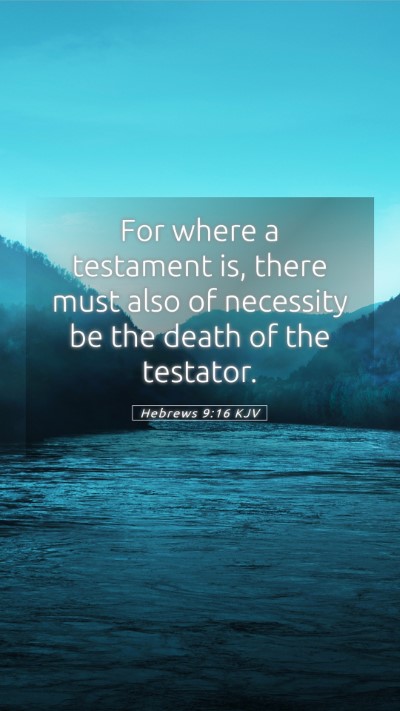Understanding Hebrews 9:16
Verse: Hebrews 9:16 - "For where a testament is, there must also of necessity be the death of the testator."
This verse is pivotal in understanding the concept of the New Covenant established through Christ's sacrifice. Below, we provide a comprehensive exploration of this scripture, drawing insights from respected public domain commentaries.
Meaning of the Verse
Hebrews 9:16 emphasizes the necessity of death for the establishment of a testament (or covenant). In biblical terms, a testament represents a legal agreement or will, which requires the death of the person who makes it to take effect. This principle indicates that the new covenant, which offers salvation and redemption through Jesus Christ, is activated by His death.
Commentary Insights
-
Matthew Henry: Henry elaborates on the legal implications of a testament, indicating that like any earthly will, it cannot be enforced until the testator dies. This serves to highlight the necessity of Christ's sacrificial death to fulfill the promises of the New Covenant.
-
Albert Barnes: Barnes focuses on how the term 'testator' applies distinctly to Christ. He underscores that Christ's death was essential to induce a transition from the Old Covenant, founded on the law, to the New Covenant, based on grace and faith.
-
Adam Clarke: Clarke views this verse within the larger context of redemption and emphasizes that the death of Jesus not only initiated the New Covenant but also provided an eternal inheritance for believers, illustrating God's profound plan for humanity’s salvation.
Key Themes and Theological Implications
- Death and Testament: The necessity of death in establishing a testament serves as a metaphor for the New Covenant. Christ's death is the essential act that brings the covenant to fruition.
- Legacy of Christ: This verse highlights how believers are now partakers of the promises made through Christ's sacrificial act, which secures their inheritance in eternity.
- Transition from Old to New Covenant: It signifies a pivotal transition in the biblical narrative, illustrating how the sacrificial system established in the Old Testament was fulfilled and superseded by Christ’s ultimate sacrifice.
Cross References
- Matthew 26:28: "For this is my blood of the new testament, which is shed for many for the remission of sins."
- Luke 22:20: "Likewise also the cup after supper, saying, This cup is the new testament in my blood, which is shed for you."
- 1 Corinthians 11:25: "After the same manner also he took the cup, when he had supped, saying, This cup is the new testament in my blood: this do ye, as oft as ye drink it, in remembrance of me."
Application and Reflection
Understanding Hebrews 9:16 invites believers to reflect on the significance of Christ’s sacrificial death. It prompts the following considerations:
- Legacy of Faith: As partakers of the New Covenant, how do we honor the legacy left by Christ?
- Living in Grace: Believers should actively embrace the grace afforded through Christ’s sacrifice, living lives that reflect gratitude and commitment to God's covenant.
- Sharing the Message: Understanding the depth of this verse encourages believers to share the significance of Christ’s death and its implications in their testimonies and communities.
Conclusion
Hebrews 9:16 serves as a profound reminder of the crucial role that Christ’s death plays in the establishment of the New Covenant. The insights drawn from commentaries provide a rich understanding of the theological significance behind this verse. Engaging in Bible study on this passage can illuminate the broader narrative of salvation and the importance of covenant in Scriptural theology.


